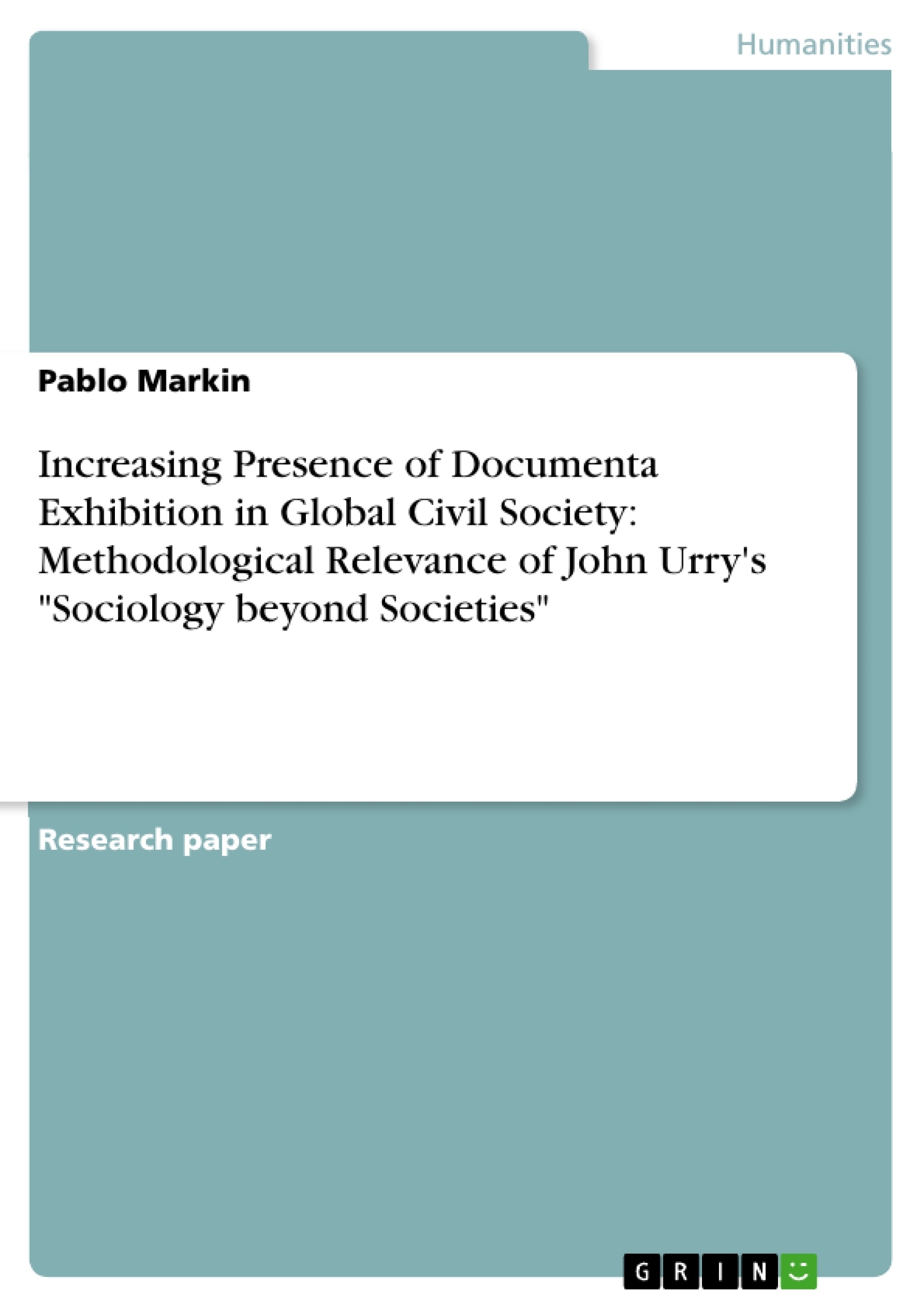In accord with the stance of John Urry (2000) and Zygmunt Bauman (2000) on the global civil society as increasingly coming into effective legal and political existence, I propose to read John Urry's Sociology beyond Societies: Mobilities for the Twenty-first Century (2000) as a springboard to application of its methodological and theoretical aspects to the international art exhibition Documenta 11. The consideration of Documenta in the context of globalization allows me to trace its impact both on the institutional form that Documenta has taken and on the range of issues that its components cover in relation to the global civil society. The five Platforms of Documenta 11 give important insight into the constitution of global civil society as a public sphere taking place beyond the nation-states. In this regard John Urry's book Sociology beyond Societies: Mobilities for the Twenty-first century (2000) gives a number of methodological starting points from which to begin to chart the contours of the global civil society in the constitution of which such global mega-events as Documenta art exhibition participate.
Inhaltsverzeichnis (Table of Contents)
- Abstract
- Introduction
- Methodological Relevance of "Post-Societal Sociology" to Documenta 11
- Five Platforms of Documenta 11
- Global Level of Documenta 11's Agency
- Conclusion
Zielsetzung und Themenschwerpunkte (Objectives and Key Themes)
This paper examines the methodological relevance of John Urry's "Sociology beyond Societies" to the Documenta 11 art exhibition, analyzing its impact on Documenta's institutional form and the issues it addresses within the context of a global civil society. It explores how Documenta 11, as a global mega-event, participates in the constitution of this global civil society.
- The increasing influence of global networks and flows.
- The application of "post-societal sociology" to the analysis of global events.
- The role of Documenta 11 in shaping and reflecting global civil society.
- The impact of globalization on the institutional form and thematic scope of Documenta.
- The concept of mobilities and their relationship to the constitution of global civil society.
Zusammenfassung der Kapitel (Chapter Summaries)
The Abstract introduces the paper's central argument: utilizing Urry's theoretical framework to analyze Documenta 11's contribution to global civil society. The Introduction situates Documenta 11 within the context of international art biennials and globalization, highlighting its role as a network connecting local and global actors. The section on Methodological Relevance of "Post-Societal Sociology" to Documenta 11 explores Urry's concept of "post-societal" phases and its implications for understanding global civil society, particularly within the context of the European Union's regulatory state and the four freedoms of movement.
Schlüsselwörter (Keywords)
Global civil society, Documenta 11, John Urry, Sociology beyond Societies, globalization, mobilities, post-societal sociology, regulatory state, international art exhibition, networks, agency.
Frequently Asked Questions
What is the focus of the paper regarding Documenta 11?
The paper examines the methodological relevance of John Urry's "Sociology beyond Societies" to the Documenta 11 art exhibition, focusing on its role in a global civil society.
How does John Urry’s work apply to Documenta?
Urry’s theories on mobilities and "post-societal sociology" provide a framework to analyze how global mega-events like Documenta participate in the constitution of global civil society.
What is the significance of the "Five Platforms" of Documenta 11?
The five Platforms provide insight into how global civil society functions as a public sphere that exists beyond the boundaries of nation-states.
Who are the central theorists mentioned in the abstract?
The primary theorists discussed are John Urry and Zygmunt Bauman, specifically regarding their views on global civil society.
What impact does globalization have on Documenta according to the text?
Globalization influences Documenta’s institutional form and the range of issues it covers, transforming it into a network connecting local and global actors.
What are the key themes of this study?
Key themes include global networks, post-societal sociology, the role of mega-events in society, and the concept of mobilities.
- Quote paper
- Dr Pablo Markin (Author), 2006, Increasing Presence of Documenta Exhibition in Global Civil Society: Methodological Relevance of John Urry's "Sociology beyond Societies", Munich, GRIN Verlag, https://www.grin.com/document/120873



